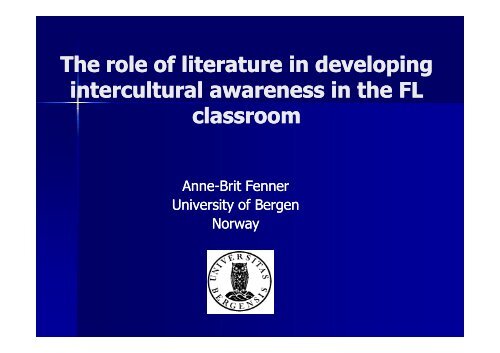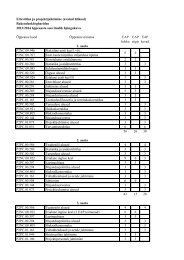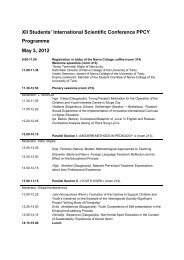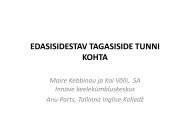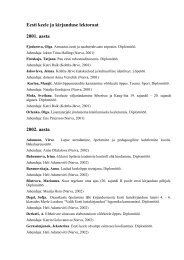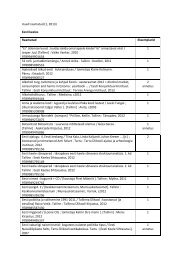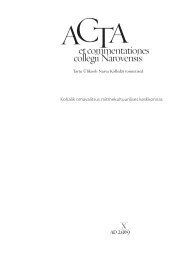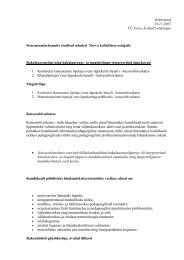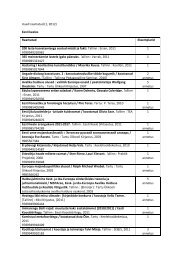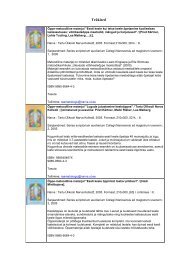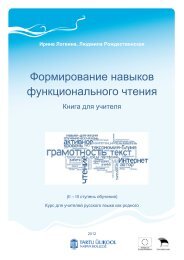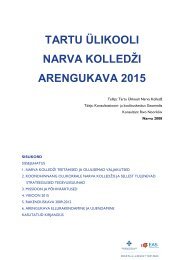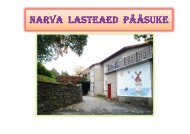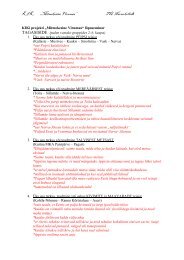Anne-Brit Fenner - narva.ut.ee
Anne-Brit Fenner - narva.ut.ee
Anne-Brit Fenner - narva.ut.ee
Create successful ePaper yourself
Turn your PDF publications into a flip-book with our unique Google optimized e-Paper software.
The role of literature in developing<br />
intercultural awareness in the FL<br />
classroom<br />
<strong>Anne</strong> <strong>Anne</strong>-<strong>Brit</strong> <strong>Brit</strong> <strong>Fenner</strong><br />
University of Bergen<br />
Norway
�� Savoir Savoir: : declarative knowledge, socio socio-cultural cultural<br />
knowledge<br />
�� Savoir faire faire: : practical skills and know know-how how and<br />
intercultral skills and know know-how how<br />
�� Savoir être être: : ’existential competence’ (Bildung)<br />
�� Savoir apprendre<br />
apprendre: : ability to learn<br />
(Common Common European European Framework Framework of of Reference Reference 2001)<br />
�� Savoir s’engager s’engager: : education – political education,<br />
critical cultural awareness<br />
(Byram1997)
Two traditions related to the teaching<br />
of cultural competence in FLT<br />
‘Bildung Bildung’ ’ as an overall aim of education –<br />
developing identity; the roles of Self and<br />
Other (citizenship)<br />
Emphasis on skills (a more instrumental view<br />
of language)<br />
Most national curricula in Europe reflect both<br />
traditions
“Culture<br />
is at base an all all-embracing embracing socially<br />
constructed world of subjectively and<br />
inter inter-subjectively subjectively experienced<br />
meanings. Culture must be<br />
constructed and reconstructed as a<br />
continuous process.”<br />
(Berger in W<strong>ut</strong>hnow, Hunter, Bergesen and<br />
Kurzweil 1984)
�� Learning abo<strong>ut</strong> abo<strong>ut</strong> culture<br />
�� Learning through through culture
Why literature?<br />
�� A<strong>ut</strong>hentic text<br />
�� Fiction: a different ’reality’<br />
�� The particular represents the general<br />
�� Individuals in historical contexts<br />
�� Identification with individuals<br />
�� Multiplicity of meaning<br />
�� Identification with the foreign culture/the<br />
Other<br />
�� The personal voice of a culture<br />
<strong>Anne</strong> <strong>Anne</strong>-<strong>Brit</strong> <strong>Brit</strong> <strong>Fenner</strong>
�� Insight into personal experiences<br />
�� The reader has to use personal experience<br />
in order to understand others<br />
�� Greater learning potential than reality,<br />
which is always in the present<br />
�� Examples of language as communication<br />
and as culture<br />
�� A tool for interpreting and structuring reality<br />
<strong>Anne</strong> <strong>Anne</strong>-<strong>Brit</strong> <strong>Brit</strong> <strong>Fenner</strong>
�� Requires personal interpretation<br />
and negotiation<br />
�� Provides good models for<br />
learners’ own text production<br />
�� The literary text is ’open’ and<br />
’undetermined’ (Iser 1991)
Literary language is not<br />
”represented [] as a unitary,<br />
completely finished finished-off off and<br />
indisp<strong>ut</strong>able language – it is<br />
represented … as a living mix of varied<br />
and opposing voices …”<br />
<strong>Anne</strong> <strong>Anne</strong>-<strong>Brit</strong> <strong>Brit</strong> <strong>Fenner</strong><br />
(Bakhtin 1981)
Reading a literary text, according to<br />
Bakhtin, creates ”suspence betw<strong>ee</strong>n<br />
<strong>ut</strong>terances”, the <strong>ut</strong>terances of the writer of<br />
the text and the potential <strong>ut</strong>terances of the<br />
reader, the inherent questions with which<br />
the reader encounters the text.<br />
<strong>Anne</strong> <strong>Anne</strong>-<strong>Brit</strong> <strong>Brit</strong> <strong>Fenner</strong><br />
(Wertsch 1992)
”Message X is not transmitted from<br />
the writer to the reader, b<strong>ut</strong> is<br />
constructed betw<strong>ee</strong>n them as a kind of<br />
ideological bridge, is built in the<br />
process of their interaction.”<br />
(Bakhtin Bakhtin & Medvedev 1985: 152)<br />
<strong>Anne</strong> <strong>Anne</strong>-<strong>Brit</strong> <strong>Brit</strong> <strong>Fenner</strong>
The Implied Reader<br />
�� In the reading process the text ’appeals’ to<br />
the reader’s expectations<br />
�� Makes the reader ask questions abo<strong>ut</strong><br />
him/herself<br />
�� ’Attacks’ the reader’s pre pre-knowledge knowledge and<br />
experience<br />
�� Allows the reader to discover Otherness<br />
�� Challenges the reader’s pesonal and cultural<br />
memory<br />
(Iser 1974, 1978)<br />
<strong>Anne</strong> <strong>Anne</strong>-<strong>Brit</strong> <strong>Brit</strong> <strong>Fenner</strong>
”The idea of interpretation adds to the<br />
simple idea of meaning that of a<br />
meaning for someone. For the agent,<br />
interpreting the text of an action is<br />
interpreting himself or herself.”<br />
(Ricoeur 1992)<br />
<strong>Anne</strong> <strong>Anne</strong>-<strong>Brit</strong> <strong>Brit</strong> <strong>Fenner</strong>
Bridging gaps betw<strong>ee</strong>n<br />
cultures through literature:<br />
�� discovering interesting aspects of<br />
Otherness<br />
�� using new discovery to develop<br />
suspicions abo<strong>ut</strong> Self/the familiar<br />
» tthe<br />
he literary text plays an active part in<br />
our lives<br />
<strong>Anne</strong> <strong>Anne</strong>-<strong>Brit</strong> <strong>Brit</strong> <strong>Fenner</strong>
Reading literature as a process<br />
of negotiation<br />
Negotiation (dialogue) betw<strong>ee</strong>n:<br />
�� text – reader<br />
�� learner – learner<br />
�� teacher – learner<br />
�� own culture – target culture<br />
�� Self – Other<br />
<strong>Anne</strong> <strong>Anne</strong>-<strong>Brit</strong> <strong>Brit</strong> <strong>Fenner</strong>
Dialogue<br />
”The idea that the other can simply<br />
reveal or disclose itself to us, witho<strong>ut</strong><br />
any work whatsoever on our part, is<br />
ultimately unintelligible. There can be<br />
no access to the other witho<strong>ut</strong> our<br />
actively organising the other in terms<br />
of our categories.<br />
(Foucault 1998: 37)
�� ”Dialogue shapes and reorganises the<br />
material learned through discussion, m<strong>ut</strong>ual<br />
questioning and reflection in a social<br />
environment (the learner together with<br />
p<strong>ee</strong>rs and teacher).”<br />
(Hietala & Niemirepo 1995 1995)<br />
�� ”a a conversation where meaning is<br />
constructed through sharing.”<br />
(Bohm 1990)
Process of negotiation :<br />
�� expectations<br />
�� answering expectations<br />
�� awareness of new expectations<br />
�� raising questions<br />
�� challenging personal and cultural<br />
experience<br />
�� creating new uderstanding<br />
<strong>Anne</strong> <strong>Anne</strong>-<strong>Brit</strong> <strong>Brit</strong> <strong>Fenner</strong>
The teacher’s task:<br />
to create a community of<br />
interpretation and negotiation<br />
<strong>Anne</strong> <strong>Anne</strong>-<strong>Brit</strong> <strong>Brit</strong> <strong>Fenner</strong><br />
(Wenger 1998)
Reading literature as a process of<br />
negotiation requires:<br />
�� Open tasks<br />
�� Personal interpretation<br />
�� Personal involvement<br />
�� Critical reflection<br />
�� developing critical attitudes<br />
�� Classroom discussion<br />
<strong>Anne</strong> <strong>Anne</strong>-<strong>Brit</strong> <strong>Brit</strong> <strong>Fenner</strong>
Taking into account, exploring<br />
and developing:<br />
�� the learner’s text<br />
�� the teacher’s text<br />
�� the resulting classroom text<br />
(Fish 1980; Iser 1978, 1991; Eco 1979, 1994,<br />
Sørensen 1983, 2002)<br />
<strong>Anne</strong> <strong>Anne</strong>-<strong>Brit</strong> <strong>Brit</strong> <strong>Fenner</strong>
Based on:<br />
�� the reader’s horizon encountering the horizon of the text<br />
(Gadamer 1979)<br />
�� the learner encountering the text with his/her habitus and<br />
cultural capital<br />
(Bourdieu 1991)<br />
�� the learner’s Zone of Proximal Development<br />
<strong>Anne</strong> <strong>Anne</strong>-<strong>Brit</strong> <strong>Brit</strong> <strong>Fenner</strong><br />
(Vygotsky 1991)<br />
�� the learner’s development from the use of everyday concepts<br />
to scientific concepts (Vygotsky 1991)
Reading as intercultural<br />
negotiation:<br />
�� learning abo<strong>ut</strong> the target culture<br />
�� learning through the target culture<br />
�� critical reflection on the reader’s own<br />
cultural identity<br />
�� developing an o<strong>ut</strong>side perspective of<br />
Self<br />
<strong>Anne</strong> <strong>Anne</strong>-<strong>Brit</strong> <strong>Brit</strong> <strong>Fenner</strong>
Intercultural negotiation<br />
based on:<br />
�� a culturally determined understanding<br />
of Self<br />
�� the literary text opening up for new<br />
understanding through experiencing<br />
the Other/Otherness<br />
�� different cultural understandings<br />
<strong>Anne</strong> <strong>Anne</strong>-<strong>Brit</strong> <strong>Brit</strong> <strong>Fenner</strong>
Developing intercultural awareness is<br />
a dialogic and dialectic process.<br />
This requires tasks which not only ask<br />
what, when, where and who, b<strong>ut</strong>,<br />
more importantly, ask why and how?<br />
Tasks which require personal<br />
involvement are vital for ’savoir être’<br />
and ’savoir s’engager’ (Bildung).


